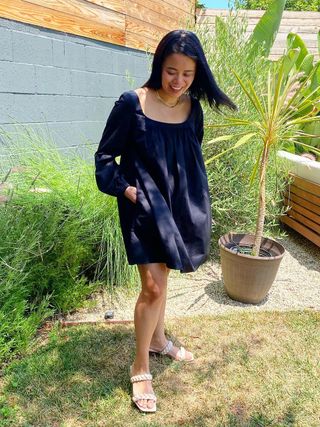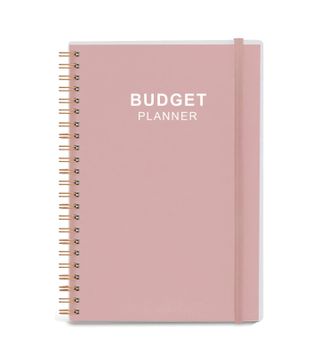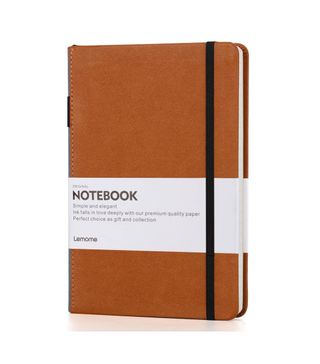I Want to Be Smarter About My Money, so I Tried a Session With a Finance Pro

For the longest time, I've been saying to myself and announcing to my family and friends that I am going to get better about my finances. To me, that meant creating a budget and sticking to it, saving more money for my emergency fund and future big purchases, contributing to my 401(k) and looking into other retirement options, trying my hand at investing, and just having a good grasp of financial literacy.
It was pretty much all talk—I was in denial that being "good" about your finances takes some effort. So I really was just expecting to one day be good at it. And one of my excuses was, "I'm not 'rich' anyway, so I don't even have that much money to handle." (I definitely knew this excuse was total BS, but it helped with my productivity guilt a little bit.) After talking to my colleagues about the topic of financial wellness last month, I realized that being "good with money" is a learned skill. It's not going to happen automatically, and you definitely don't need to have a full bank account to start learning.

Of course, everyone's financial situations are different, and I knew not every article, book, or podcast was going to solve all my money problems. I decided that in order to get started on this whole financial-wellness journey, I needed to do my research by reading books, finding podcasts that I found helpful, and finding some trusted experts and sources to follow, but I probably also needed a little personalized help.
One of my colleagues suggested I look into Ellevest, a women-founded and -run financial company whose mission is "to get more money in the hands of women." The company helps you get started with investing. When you sign up, they'll create a personalized investment portfolio for you, and the investment algorithm also takes into account other factors that women may face, like pay gaps and career breaks. Members also get access to online workshops, email courses, video resources, and discounts on personal coaching sessions with financial planners. There are three tiers of membership: Essential ($1/month; $12/year); Plus ($5/month; $54/year); and Executive ($9/month; $97/year).

I was most interested in the personal coaching sessions. The company offers so many different options based on a variety of topics, like budgeting and debt planning, career-clarity coaching, homebuying strategy, résumé reviewing, retirement, and even a full financial-planning session. Ellevest generously gave me a complimentary session to help with my article, so I decided to start a Money Check-Up session for a general overview and advice.
During the 30-minute session, you can focus on one or two topics from a list to discuss with a financial planner: how to build an emergency fund, 401(k) versus IRA, Roth versus traditional retirement accounts, how to save for big money goals, if you should roll over a 401(k), and how to prioritize money goals. When I signed up, I specified the topics I wanted to discuss during my session—for this one, I picked the difference between a 401(k) and IRA and saving for big money goals.
What Happened During the Session
Since I'm not an Ellevest member and don't have a profile on the platform, I wondered if that would be a deterrent since I would have to explain my financial situation to the advisor during the call. Since I only had 30 minutes, I decided to prep as much as I could before the call so I could maximize my time. I wrote down a short summary of my current financial situation and also some specific questions I had for each topic.
When it came time for my call, I was ready and excited to chat. My financial advisor, Jodi, gave me a call right on time, and we got right to it. She asked me to share a little bit about my background and also my specific questions on the topic, so I'm glad I prepped all of that beforehand. I'm going to spare you all the nitty-gritty details of the phone call, but I found it was both really helpful and went by so quickly. Jodi answered all my questions patiently and thoroughly, and she was very well-versed in the topics. I felt comfortable chatting with her and didn't feel judged or that I was being talked down to. Honestly, it kind of felt like I was chatting with my mom but without the guilt (ha—sorry, mom!).
Jodi gave me some action items to consider during our call, which included opening a high-yield savings account and consolidating my 401(k) accounts. She also sent me a follow-up email after the session with a summary of our conversation and some more resources to check out based on the topics we discussed.
My Honest Review
Overall, I thought the session was helpful. I definitely could have spent several hours on the phone with her asking all my finance questions, but I think for the two topics I chose, 30 minutes was a good place to start. I also really appreciated that Jodi was completely non-judgmental and patient. I think it's so important to have that, especially if you want to come away from the session feeling empowered, which I did. It's hard to be honest about your situation or ask the questions you really want to ask if you feel like someone is judging your choices or acting like you're dumb.
I would be open to trying out other sessions in the future and maybe even trying out a membership, too. I think it's a great resource and platform if you're just getting started with investing and learning more about financial literacy. It's so easy to book a session, and you can do it all without leaving your home.
As for what's next for me in my financial-wellness journey, I'm looking to explore my options even more, which includes doing more reading and research from various experts and sources, and also perhaps even looking for a financial planner that I can meet with in person and develop a relationship with over time.
How do you take care of your financial wellness? What resources should I check out? I'd love to know—send me a DM at @sarahayang or @thethirty.
Next, 15 Smart Budgeting Tips Finance Experts Want You to Know
Disclaimer
This article is provided for informational purposes only and is not intended to be used in the place of advice of your physician or other medical professionals. You should always consult with your doctor or healthcare provider first with any health-related questions.
Sarah is lifestyle writer and editor with over 10 years of experience covering health and wellness, interior design, food, beauty, and tech. Born and raised in Los Angeles, she attended New York University and lived in New York for 12 years before returning to L.A. in 2019.
In addition to her work on THE/THIRTY and Who What Wear, she held editor roles at Apartment Therapy, Real Simple, House Beautiful, Elle Decor, and The Bump (sister site of The Knot).
She has a passion for health and wellness, but she especially loves writing about mental health. Her self-care routine consists of five things: a good workout, “me” time on the regular, an intriguing book/podcast/playlist to unwind after a long day, naps, and decorating her home.
-
 Elizabeth Olsen Wore the Controversial Pant Trend That's the Opposite of Jeans
Elizabeth Olsen Wore the Controversial Pant Trend That's the Opposite of JeansShe makes it look so chic.
By Allyson Payer
-
 Demi Moore Just Wore a Naked Dress Made Entirely of Crystals
Demi Moore Just Wore a Naked Dress Made Entirely of CrystalsChic.
By Drew Elovitz
-
 Nicole Richie's Always Been My Muse, But These 5 Looks Are Even Chicer Than Usual
Nicole Richie's Always Been My Muse, But These 5 Looks Are Even Chicer Than UsualFrom Saint Laurent to Schiaparelli.
By Eliza Huber

